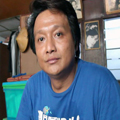The past year was full of dramatic changes for Burma, and the year ahead promises to bring more of the same. While no one can truly know what the future holds, The Irrawaddy spoke to a number of prominent social, cultural and political figures in the country about what they expect to see in 2013. Below are some of their observations, which highlight the challenges and opportunities facing Burma in the year just begun.
Wine, director of the well-known short film “Cut that Scene”
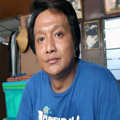 I have to admit that I wasn’t able to create a really great movie in 2012, so in 2013, I want to make a movie that’s really out of the ordinary, something that really pushes my abilities to the limit.
I have to admit that I wasn’t able to create a really great movie in 2012, so in 2013, I want to make a movie that’s really out of the ordinary, something that really pushes my abilities to the limit.
It isn’t easy making good movies in Burma. Most filmmakers only spend about a month on each movie, and there are lots of problems, such as the lack of proper contracts. Quality matters less than quantity, at least from a business perspective. Some actors and actresses don’t really respect directors. To make a really decent movie takes at least six months, and we all need to change our habits and work together.
So in the year ahead, I hope everyone in our industry will work with proper discipline and change their mindset to produce movies with real artistic value. I apologize to my fans for not making any high-quality films last year, but promise I will do my best in 2013.
Myint Myint Khin Pe, wife of Free Funeral Service Society (FFSS) founder Kyaw Thu
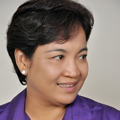 Nobody know what the year ahead will bring, but we sincerely hope for peace in the country so that the people will not have to suffer. If there are wars and people are in need, we will do all we can to help those who need our support.
Nobody know what the year ahead will bring, but we sincerely hope for peace in the country so that the people will not have to suffer. If there are wars and people are in need, we will do all we can to help those who need our support.
In 2012, we opened a clinic for eye operations and were able to treat those who could not afford to fix their vision. We also managed to extend our support to local civil society organizations in Prome, Pegu and Gyopingauk in Pegu Division and open clinics in those areas. In the future, we are hoping to give financial support to other places in need to establish free funeral services and hope to cooperate with young people and doctors who are interested in volunteering with us.
We all want democracy, but it isn’t something anyone can just give to you. We have to practice it ourselves in every aspect of our lives. For example, we should be disciplined and patient when we are standing in line, and we should not get involved in corruption by giving money under the table to officials when we go to government offices. It’s all about the Buddha’s teachings. The principles of democracy—independence, freedom, human rights and responsibilities—are all present in the teachings of the Buddha. If we all follow and practice what the Buddha taught, we will be able to live peacefully, with democracy and dignity.
Nang Khin Zay Yar, Miss International 2012 People’s Choice Award winner and FFSS volunteer
 I will continue doing philanthropic work this year, and work as an artist and tour guide as well. I will spend about two-thirds of my time doing social work. I will also share my experience with new models who will take part in the Miss Myanmar International contest next month. I just want to tell young that success is there for those who try their best.
I will continue doing philanthropic work this year, and work as an artist and tour guide as well. I will spend about two-thirds of my time doing social work. I will also share my experience with new models who will take part in the Miss Myanmar International contest next month. I just want to tell young that success is there for those who try their best.
Kyaw Yin Myint, writer and member of the Myanmar Journalists Association
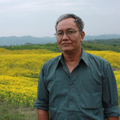 We can say that we’ve gained a little press freedom in 2012, but not much. The government’s decision to allow the publication of privately owned dailies is another step towards press freedom. I hope that we can work more freely in 2013 and produce and read valuable news. If we have press freedom, we will be able to produce accurate news without concealing the truth. To all journalists and press people, I want to say this: be careful, and don’t misuse the opportunities afforded by press freedom for you own purposes, as that will only give ammunition to critics who say we are not worthy of this freedom.
We can say that we’ve gained a little press freedom in 2012, but not much. The government’s decision to allow the publication of privately owned dailies is another step towards press freedom. I hope that we can work more freely in 2013 and produce and read valuable news. If we have press freedom, we will be able to produce accurate news without concealing the truth. To all journalists and press people, I want to say this: be careful, and don’t misuse the opportunities afforded by press freedom for you own purposes, as that will only give ammunition to critics who say we are not worthy of this freedom.
Soe Tun, member of the 88 Generation Students group
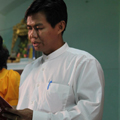 We continue to hope things will change for the better in our country, but so far we have been disappointed. For example, there is still the problems of farmers having their land confiscated and workers having to fight for their basic rights. This is all because of the regime’s lack of transparency. The best example of this is the Letpadaung copper mine case. To achieve real political change, transparency is very important. We are ready to serve our country and our people by continuing to push for genuine change and real democracy. For me, I would like to focus on the welfare of the farmers. In our country, the majority of ordinary people are farmers, who live in poverty even though they produce rice, the country’s most important commodity. If the farmers suffer, we all suffer.
We continue to hope things will change for the better in our country, but so far we have been disappointed. For example, there is still the problems of farmers having their land confiscated and workers having to fight for their basic rights. This is all because of the regime’s lack of transparency. The best example of this is the Letpadaung copper mine case. To achieve real political change, transparency is very important. We are ready to serve our country and our people by continuing to push for genuine change and real democracy. For me, I would like to focus on the welfare of the farmers. In our country, the majority of ordinary people are farmers, who live in poverty even though they produce rice, the country’s most important commodity. If the farmers suffer, we all suffer.
Phyu Phyu Thin, NLD MP and founder of a clinic for patients with HIV
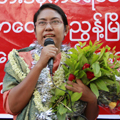 We would like to cooperate more with every group that is working for those who live with HIV. We are glad to see that many young people are interested in helping these people. We are planning to work countrywide to help the patients. We would like to ask the people of Burma to do more to help these people and want to thank all of the supporters and donors who are helping us. We are currently upgrading the home for the HIV patients in Rangoon, which can accommodate only around 300 patients. After finishing, it will hopefully able to accept 400 people.
We would like to cooperate more with every group that is working for those who live with HIV. We are glad to see that many young people are interested in helping these people. We are planning to work countrywide to help the patients. We would like to ask the people of Burma to do more to help these people and want to thank all of the supporters and donors who are helping us. We are currently upgrading the home for the HIV patients in Rangoon, which can accommodate only around 300 patients. After finishing, it will hopefully able to accept 400 people.
D Nyein Lin, leader of the Organizing Committee for the Students’ Union League
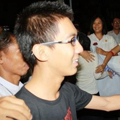 I hope that Burma will start moving toward greater equality, justice and respect for human rights. That’s what we, the activists, aim for. I want my country to be peaceful, but our people still face civil war and challenges to the rule of law and human rights. We could reach our goals if all of us, including the government, work together.
I hope that Burma will start moving toward greater equality, justice and respect for human rights. That’s what we, the activists, aim for. I want my country to be peaceful, but our people still face civil war and challenges to the rule of law and human rights. We could reach our goals if all of us, including the government, work together.
I want student unions to be formed in all of Burma’s hundreds of universities in 2013, and for them to interact with international students’ unions. We, the students, are also ready to assume a political role in the country.


